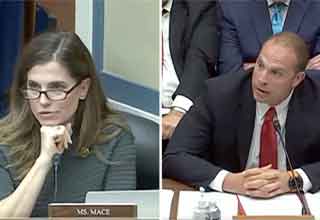Education, Science and Discovery
Today, the solitary inventor, tinkering in his shop, has been overshadowed by task forces of scientists in laboratories and testing fields. In the same fashion, the free university, historically the fountainhead of free ideas and scientific discovery, has experienced a revolution in the conduct of research. Partly because of the huge costs involved, a government contract becomes virtually a substitute for intellectual curiosity. For every old blackboard there are now hundreds of new electronic computers.
The prospect of domination of the nation's scholars by Federal employment, project allocations, and the power of money is ever present and is gravely to be regarded.
Yet, in holding scientific research and discovery in respect, as we should, we must also be alert to the equal and opposite danger that public policy could itself become the captive of a scientific technological elite.
It is the task of statesmanship to mold, to balance, and to integrate
these and other forces, new and old, within the principles of our
democratic system, ever aiming toward the supreme goals of our free
society.
Throughout America's adventure in free government, the basic purposes have been to keep the peace; to foster progress in human achievement, and to enhance liberty, dignity and integrity among people and among nations. To strive for less would be unworthy of a free and religious people. Any failure traceable to arrogance, or lack of comprehension or readiness to sacrifice would inflict upon them grievous hurt both at home and abroad.
Progress toward these noble goals is persistently threatened by the conflict now engulfing the world. It commands our whole attention, absorbs our very beings. We face a hostile ideology, global in scope, atheistic in character, ruthless in purpose, and insidious in method. Unhappily the danger it poses promises to be of indefinite duration. To meet it successfully, there is called for, not so much the emotional and transitory sacrifices of crisis, but rather those which enable us to carry forward steadily, surely, and without complaint the burdens of a prolonged and complex struggle, with liberty the stake.
Only then shall we remain, despite every provocation, on our charted course toward permanent peace and human betterment.
Crises there will continue to be. In meeting them, whether foreign or domestic, great or small, there is a recurring temptation to feel that some spectacular and costly action could become the miraculous solution to all current difficulties. A huge increase in newer elements of our defense; development of unrealistic programs to cure every ill in agriculture; a dramatic expansion in basic and applied research, these and many other possibilities, each possibly promising in itself, may be suggested as the only way to the road we wish to travel.
Each proposal must be weighed in the light of a broader
consideration: the need to maintain balance in and among national
programs, balance between the private and the public economy, balance
between cost and hoped for advantage, balance between the clearly
necessary and the comfortably desirable, balance between our essential
requirements as nations and the duties imposed by the nation upon the
individual; balance between actions of the moment and the national
welfare of the future. Good judgment seeks balance and progress; lack
of it eventually finds imbalance and frustration.
I ask you citizens, it has been fifty years since this has been written, have we paid any attention? Fuck no, and it is unlikely we ever will, for it may now be too late. Excerpted from the Military-Industrial Complex Speech, Dwight D. Eisenhower, 1961






0 Comments